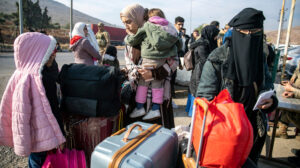Debates over the asylum claims of Syrian refugees in our country and across Europe have been sparked from the first moment the fall of the Assad regime. The asylum application process is temporarily “frozen” for thousands of Syrians who are in our country, as the main argument for their asylum applications, persecution by the Assad regime, may be unfounded. The situation in Syria is still particularly volatile as the new leadership that has emerged both calls itself interim and has not shown signs of governance.
Due to the recent developments that have created uncertainty, the Asylum Service has been making a specific recommendation since last week to the Minister of Immigration and Asylum, who has forwarded this recommendation to the senior political leadership and to the KYSEA. “The recommendation of the Asylum Service states that due to the latest developments in Syria and precisely because there is a very strong uncertainty and volatility regarding the new situation in the country of Syria, we cannot and are not in a position as an agency to proceed with issuing asylum decisions for Syrian nationals. And we cannot do this because you should know that every asylum decision is individualised and based on specific characteristics of the applicant, which are related to his or her country of origin, that is, what conditions prevail in Syria. Well, all our decisions until recently have had a lot to do with possible persecution that Syrians face from the Assad regime. That regime no longer exists, so we need to review and reassess the situation in Syria at the moment. Our decisions are not based on speculation, suspicion or speculation. We need concrete, reliable sources and reports, and I am not referring to media coverage of the event. We are referring to material from the UN High Commissioner, the European Asylum Organisation, and so on. We don’t have that in our hands at this stage, and we can’t proceed to issue decisions,” explains APE-MPA the Commander of the Greek Asylum Service, Marios Kaleas.
For this reason, until the situation is clarified and new decisions are taken based on reliable sources, the Asylum Service will accept requests from Syrians, as it is obliged by the Geneva Convention, but will not issue final decisions. “That means that any Syrian who comes today to Samos, for example, or Lesvos to the Outpost of Orestiada can submit the asylum request, it will be recorded, it will be protocolized, the person can submit any documents he wants, he can go through the asylum interview, to hear the reasons why he does not wish to return to his country, but as far as the issuance of the decision, which is the final stage, there should be a suspension of the procedure until further notice, to see how the situation will be clarified and how it will evolve”, Mr. Kaleas.
What will happen with the return of Syrians to their country?
As far as voluntary returns are concerned, any Syrian in Greece and in any member state can give up their claim or their status and return to their country. It is expected that after the fall of Assad, once the situation is clear and conditions create a climate of security, Syrians displaced throughout Europe will want to return home. But that number is still low just a week after the fall of the regime. According to sources from the Migration and Asylum Ministry, three Syrian refugees from shelters in Greece have already expressed a desire to return to Syria. The first one, from the Filippiada facility, married and a father of two children, gave up the asylum status he had applied for in the autumn of 2024. Despite his initial concerns about security in Syria, he declared his determination to return. A similar wish was expressed by a refugee in the Drama facility and another in the Controlled Facility in Koutsochero.
“Voluntary returns can take place in two ways. Either each Syrian can give up and leave the country, i.e. Greece, returning via Turkey at his own expense. And the second is through the Voluntary Returns Programme, which is implemented by the International Organization for Migration in cooperation with the Ministry of Immigration and Asylum. The problem in this case is that at the moment it is not doing voluntary returns in Damascus and Syria, precisely because there is this tense atmosphere and this uncertain climate. As soon as it is restored, this process will be started, that is, voluntary returns through the IOM, who also give them 1,000 euros and airline tickets, is another second alternative,” the Asylum Service commander says.
“But as far as forced returns are concerned, that is where the problem lies. For a forced return to take place means that the asylum claim has first been rejected, which means that a negative asylum decision must have been issued. For a negative asylum decision to be issued, it means that the situation in Syria has to be reassessed and it has to be such that the Asylum Service, which is the competent authority, considers that there are no grounds for asylum,”Kaleas explains.
In Greece, 9,328 asylum applications (as of December 10) have been submitted by Syrian nationals residing in structures of the Structure and Identification Service. Of these, 3,091 have been accepted after processing, 1,550 applications are in the registration phase or are being registered, 4,474 are being processed, and 213 applications have been rejected.
Decisions at European level
Many of the European countries have put a freeze on the processing of applications or plan to do so. As the Minister of Immigration and Asylum, Nikos Panagiotopoulos, said from Brussels after the meeting of the Internal Affairs Council of member states’ interior and immigration ministers, it was agreed to start working on a plan for the return, voluntary at first, of any Syrian citizens who wish to return to their country.
The UN High Commissioner for Refugees (UNCHR) estimates that European countries host over one million Syrian asylum seekers and refugees, with 59% of them in Germany. Significant populations are also hosted by Sweden, Austria, Greece, the Netherlands and France.
Last year, about 38,300 Syrian refugees chose to return, the agency said in an annual review, noting that conditions inside the country “were not yet conducive to facilitating large-scale voluntary returns in safety and dignity.”
Concerns about security, livelihoods, basic services, and housing were cited as reasons for the low repatriation rate. About 90 percent of people in Syria live in poverty.
Ask me anything
Explore related questions





